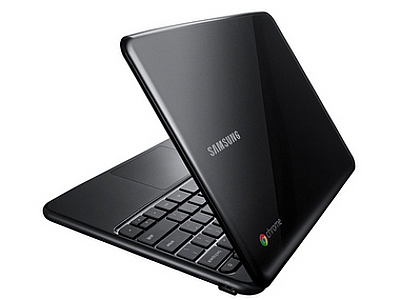Chrome OS May Be Heading to ARM After All
Google's upcoming "Daisy" Chromebook will reportedly use Samsung's ARM-based Exynos 5250 SoC.
ChromeStory reports that the rumored "Daisy" Chromebook will be powered by Samsung's upcoming ARM-based Exynos 5250 SoC.
Announced back in November 2011, this 32-nm chip is based on two ARM Cortex-A15 MPCores clocked at 2.0 GHz, and an ARM Mali-T604 MP4 GPU. So far the chip isn't due to go into mass production until 2Q12, meaning it may be a while before we see the ARM-based Chromebook arrive on the market. However, once it goes live, it will be the first Chrome OS device to actually run on an ARM-based chip.
Samsung reports that the Exynos can handle 14 billion instructions per second, making it twice as fast as the 1.5 GHz dual-core ARM Cortex-A9 chip. The new chip will also reportedly deliver four times the 3D graphics performance than current solutions once "Daisy" hits the market, pushing displays up to WQXGA (2560 x 1600) resolution. The memory bandwidth itself will be an incredible 12.8 GB/s.
So far little else is known about the actual "Daisy" Chromebook itself. Currently it's mentioned in the Chrome OS code as well as bugs, referred to as "Type of computer: Daisy." The only other detail uncovered thus far is a possible Ethernet port, leading to speculation that it could be an actual Chromebook or a Chromebox.
Last we heard, Chrome OS wasn't coming to tablets or smartphones, that it was focused on the laptop/netbook form factor. Sundar Pichai, Senior VP of Chrome, made this announcement back at Google I/O 2011 but didn't necessarily rule out ARM-based notebooks and netbooks.
"[Chrome OS] is a new experience we're working on," he told the audience. "It's hardware agnostic in a sense. We are fully, 100 percent focused on laptops. Most of the web usage -- greater than 90 percent -- is on laptops. That's what we're working on today, and we have no other plans on any other form factors."
Get Tom's Hardware's best news and in-depth reviews, straight to your inbox.

Kevin Parrish has over a decade of experience as a writer, editor, and product tester. His work focused on computer hardware, networking equipment, smartphones, tablets, gaming consoles, and other internet-connected devices. His work has appeared in Tom's Hardware, Tom's Guide, Maximum PC, Digital Trends, Android Authority, How-To Geek, Lifewire, and others.
-
digiex ReplyLast we heard, Chrome OS wasn't coming to tablets or smartphones, that it was focused on the laptop/netbook form factor.
This make sense since it will be competing with Android. -
COLGeek Logical means to expand the OS. Not surprising and should be a very simple port as the work has largely been done for other similiar products.Reply -
richarduk Raspberry Pi is Arm11. A15 is a 64bit arch, so unlikely. Also with SOC's it is not just the CPU arch that has to be ported but the whole system. They are not like PC's that have many standard systems and a 'BIOS'. Two SOCs that seem the same can be chalk and cheese. I have worked with SOCs for many years and have never had a system that can use another's Linux build. But having said that, the Pi is so massively popular (if only they shipped them) that there is always a chance that someone will hack a kernel to get chrome os to work. ;-)Reply -
joytech22 richardukThe Pi is so massively popular (if only they shipped them) that there is always a chance that someone will hack a kernel to get chrome os to work. ;-)Reply
Still waiting for mine. :( Should come sometime next month though.
Anyway back on topic.. ARM looks like the direction computing will be taking.
All I see nowdays is ARM devices taking over, in fact almost every PC owner has a phone using an ARM processor. PC's may follow trend when they become more powerful clock-for-clock with current x64 CPU's.
Yes there may initially be compatibility issues with x86 software but sacrifices must be made in one area to advance in another.
Now to have my butt handed to me in downvotes for supporting ARM.. lol. -
richarduk:Reply
Arm11 uses the same instruction set as A15. A15 is _not_ 64-bit. And although you need some startup code to run on a certain board, linux is more or less the same on every board. Linaro is shipping binary builds, so it cannot be _that_ different. You do need to have a binary package (drivers) - but you need that on desktop as well.
